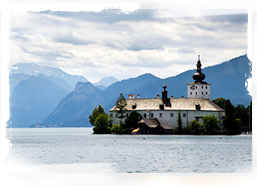An Introduction to Austria
Todays Austria is small - by its historical standards; mostly mountainous - only a third of the country lies below 500m; and rich, with a nominal GDP per capita a fraction below $50,000. Better, or worse, than in 1914 when it was huge covering territories including much of what became Yugoslavia; Hungary; Cechoslovakia; and southern Poland and bankrupt, holding together a mish-mash of vassal states through a combination of power sharing (with Hungary), concessions and a ubiquitous secret police? See full country profile.Latest Research News from Europe (Other)
18 current Other European jobs including:
Customer Support Executive - Become the Client Success Hero at Ipsos.Digital, Bucharest Office or Remote (Romania), EUR Competitive salary & benefits - (posted Jul 22 2025)
PHP Developer - Engineer Revolutionary Features for Ipsos.Digital's Research Platform, Bucharest Office or Remote (Romania), Competitive salary & benefits - (posted Jul 16 2025)
Senior C#/.NET Software Engineer (Backend), Remote (Romania), Competitive salary and benefits - (posted Jul 15 2025)

GOVERNMENT: Federal Parliamentary republic
AREA: 83,855sq km
POPULATION: 8,414,638 (July 2011 est.)
MAJOR LANGUAGE: Official Language: German

Some business and general info
The Market Research Industry
Trade and Industry in Austria
Its the arts, however, that spring to most minds when Austria is mentioned, and its perhaps in classical music that the country has its most famous son. Haydn, Liszt, Strauss and Schubert were all Austrian but none really takes the crown as its greatest composer. Wolfgang Amadeus Mozart (christened Johannes Chrysostomus Wolfgangus Theophilus Mozart) was born in Salzburg in 1756 and died in Vienna in 1791. Examples of his genius are legion. In his 35 years he wrote more than 600 works, composing from the age of five and performing before European royalty as a small boy. Wh'le in Rome in 1770 he attended two performances of Allegris Miserere in the Sistine Chapel and later wrote it out from memory, thus producing the first unauthorised copy of a score closely guarded by the Vatican. It seems unthinkable that he spent much of his life struggling financially, and travelled much of Europe performing but also looking for more lucrative employment. In May 1771 Mozart was dismissed by his then-employer Archbishop Colloredo literally with a kick up the *rse from the Archbishops steward, Count Arco. In the midst of all this he wrote many of the greatest and best known works in the classical repertoire, The Marriage of Figaro, The Magic Flute, DonGiovanni, the Requiem, canons, minuets, arias, rondos, clarinet and horn concertos, 41 symphonies and 27 piano concertos. His influence on later composers is profound and 220 years after his death his music is among the most popular on the planet.
Go to next country
Todays Austria is small - by its historical standards; mostly mountainous - only a third of the country lies below 500m; and rich, with a nominal GDP per capita a fraction below $50,000. Better, or worse, than in 1914 when it was huge covering territories including much of what became Yugoslavia; Hungary; Cechoslovakia; and southern Poland and bankrupt, holding together a mish-mash of vassal states through a combination of power sharing (with Hungary), concessions and a ubiquitous secret police?
Charlemagne conquered the area in the 8th century and introduced Christianity. It later became a duchy in various hands until the 13th century when its rule was assumed by the Habsburgs, one of the great families of European history and in power until 1918. Too often remembered for its lingering demise, the Habsburg Empire achieved remarkable cultural, social and military feats - the last including fighting off the inroads of the Ottoman conquerors into Europe.
GDP: $352 bn (2011 est.); $49,809 per capita
Religions Roman Catholic 73.6%, Protestant 4.7%, Muslim 4.2%, other 3.5%, unspecified 2%, none 12% (2001 census)
Currency: Euro
Telephone Code: + 43
MR Association(s):
Verband der Marktforscher Osterreich (VM)
Austria is the 22nd largest research market in the world, and the 12th largest in Europe. According to the ESOMAR Global Prices Study 2012 the country was the 19th most expensive for carrying out research.
Source: ESOMAR
The 12th richest country in the world in terms of GDP per capita, Austria has a well-developed market economy and a high standard of living. Much of its industry was nationalised until the 1980s but it has now moved to fairly normal levels of state ownership. Labour movements remain strong and influential, and industrial production and tourism (9% of GDP) are key sectors of the economy.
EU membership has enabled Austria to reduce its economic dependence on the German economy, although links remain strong. Its position between the old eastern and western Europe has drawn much foreign investment, and has encouraged its companies to engage actively its newly free neighbours. Like Germany and other nations, Austrias economy contracted in 2009 but has since grown beyond its size in 2008. In the debt crisis, its exposure to the economies to the east notwithstanding, its fiscal position compares favourably with other countries in the Eurozone.
Austrian exports totalled $180.7 bn in 2011, and in addition to machinery, vehicles, metals and chemicals, included paper and board as major commodities. Germany took 32.1% of the total in 2009 Italy is the only other partner above 5% (7.9% in 2009). Imports, which totalled $183.1 bn in 2011, are even more dependent on Germany, which supplied a massive 44% in 2009 - Italy and Switzerland also contributing more than 5% apiece. Key products are machinery and metals, vehicles, chemicals, oil and foodstuffs.
Email me:
laurence@mrweb.com

